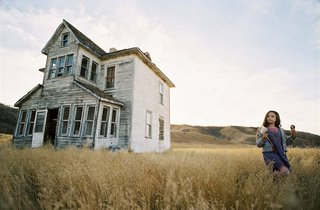
Tideland * Terry Gilliam * 2005
I had such high hopes for Tideland. Terry Gilliam’s latest, I had been planning on going to see it at IFC Center on Saturday, only to discover that not only was that the last day of its run, but there was only one showing, at 11:40 p.m. This information was somewhat discouraging—especially when, after a full day of wandering around the city, starting with the WFMU record fair, I was beginning to yawn around 9:30—but I decided to wait it out and see the movie, despite the inevitable resulting 2:30 a.m. bedtime.
Gilliam’s brief introduction—in which he states that “many of you are not going to like this film,” and instructs the viewer to “forget your prejudices, fears, and preconceptions that you have developed as an adult,” to watch the film through a child’s eyes—was the first indication that I had made an error in judgment.
Usually when everyone seems to hate a film, it only drives me to like it even more; conversely, when everyone seems to love a film, I tend not to have much interest in it. So the statement that “many people are not going to like this film” didn’t really bother me; it was more the presence of the disclaimer itself. I don’t like being told how to view a film; there’s always more than one way to look at art. Gilliam clearly has in mind a specific mode for perceiving Tideland, but that doesn’t mean he should provide the audience with instructions. If a film is successful, that intended way of seeing should be self-evident; if Tideland is meant to be portrayed through the eyes of a child, then the viewer should understand that simply from watching the film.
Based on the novel by Mitch Cullin, Tideland follows the plight of Jeliza-Rose, a 10-year-old girl whose job is to cook up daddy’s heroin so he can take a “vacation.” When her shrill, caricatureish mother, who often sounds like she’s coughing up a lung, violently O.D.s, her dad takes Jeliza-Rose to his mother’s dilapidated (vandals have spraypainted the phrase “fucking shithole” on the wall, perhaps a more appropriate description) farmhouse somewhere in the Midwest, where he proceeds to take a permanent vacation in an easy chair.
Left alone in the middle of nowhere, Jeliza-Rose, apparently oblivious to her situation, frolics in the wheat fields surrounding the house, playing with her deformed-looking severed Barbie doll heads, and later her freakish and only neighbors, Dell (an amateur taxidermist obsessed with bees) and Dickens (Dell’s semi-lobotomized mentally challenged brother). Gradually, she slips further and further from reality, conversing with squirrels that live in the walls, and imagining herself swimming in an underwater kingdom. (Eventually, we begin to hear the dolls’ voices when Jeliza-Rose’s mouth is closed, perhaps implying that the girl is experiencing auditory hallucinations.)

Perhaps my most significant problem with this film is that Jeliza-Rose shows no emotion, no fear. She barely reacts to anything that happens to her, no matter how horrific, appearing totally oblivious to the fact that her father is rotting in her living room. Instead of grieving, she climbs onto his lap, despite the flies and his blackish-purple tongue, and asks him why he won’t talk to her anymore. It makes sense for her to retreat into a fantasy world as a defense mechanism—but not completely. This film would have been more moving and sympathetic if she expressed at least some fear for her situation, and, moreover, grief for her parents. A ten-year-old knows what death is—I know I did. Thus, this ostensible lack of understanding (or perhaps acknowledgement) of her parents’ death does not compute.
In general, the “innocence of children” aspect was overplayed, to the point of ineffectiveness. Jeliza-Rose’s naiveté does not allow her to comprehend the gravity of what has befallen her. And yet, her apparent precociousness makes it hard believe that she is as innocent as she is acting. Towards the end of the film, she has decided that Dickens is her boyfriend, resulting in a few kisses (albeit quick pecks) and vaguely unsettling sexual references. The people involved don’t understand what they’re saying (they think that wiggling your tongue around in someone’s mouth is silly, or funny), and yet there’s something about Jeliza-Rose that seems more adult, seductive. She tells Dickens that if he shows her his "special secret" she'll love him forever, laying back on his bed tauntingly, most likely in imitation of someone, perhaps her mother.
The film does possess stunning cinematography—though the falling down the rabbit hole sequence is a little clichéd and cheesy, what with the floating syringes—and oddly beautiful imagery, such as Dell wandering around looking like Death in her black beekeeper’s outfit, her dance around the burning beehives, the train crashing through the wheat fields. On the clichéd end, most of the camera shots are tilted at exaggerated angles—while Jeliza-Rose and her father are traveling to the farmhouse, it looks like their bus is falling through space—with extreme close-ups of the actors’ faces. (Okay, I get it; the movie is told through the eyes of a child—enough already!)
This film had so much potential for greatness. If Gilliam had held back just a little, exercised some subtlety or restraint, I might have felt differently about it. Instead, it overdoes everything, from the acting (the portrayal of a mentally challenged man is fairly exaggerated, and Jeliza-Rose’s fake Southern accent is awful to the point of grating) to the mode of storytelling. Paradoxically, as the story becomes more and more outrageous, it also becomes more and more boring. For me, this was an utter disappointment.

No comments:
Post a Comment